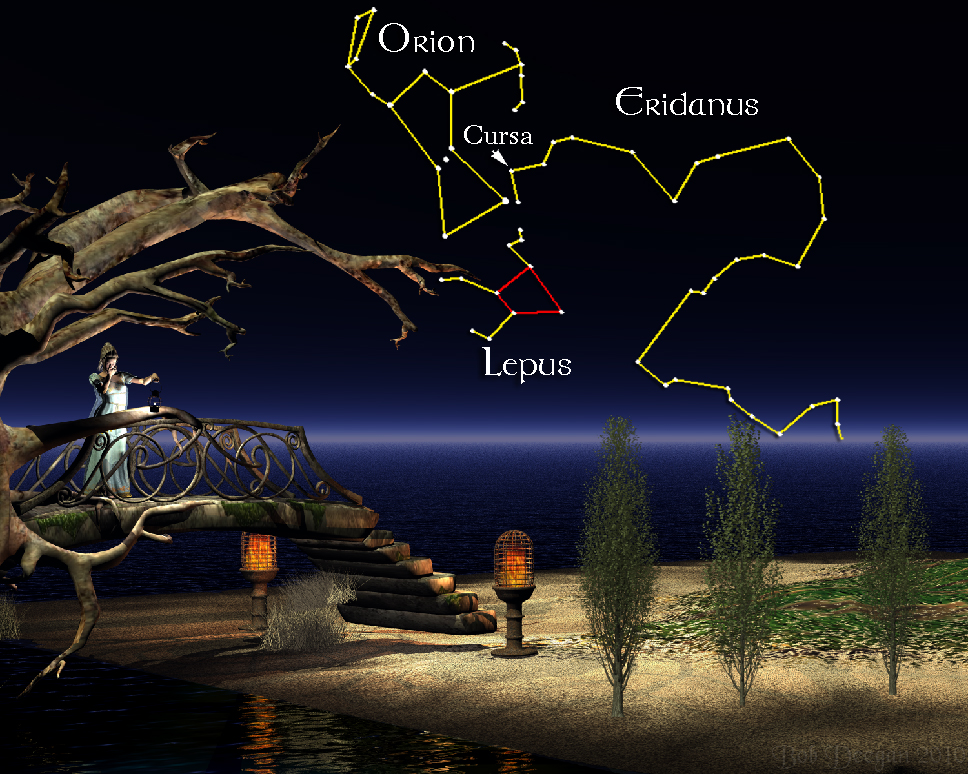
For the week including January 29, 2010

ERIDANUS, THE RIVER
Looking to the south around 9 o’clock near the famous group of stars called Orion, the Hunter, is one the lesser-known constellations, Eridanus, the River. This constellation is one of the longest in the night sky, and begins at the bright star Cursa, near the base of Orion.
The legend behind this constellation came from Greek mythology and began when a single mother, Clymene, informed her son and daughters that their missing father was none other than Apollo, the Sun God. Once they got over their shock, her daughters were delighted by the news since this explained their great beauty (and possibly their overbearing vanity). The teenaged boy, Phaethon, exclaimed that maybe one day his father might let him fulfill his dream of driving the Chariot of the Sun across the sky! Hearing this, his sneering sisters gleefully set up a campaign of teasing and mockery, telling Phaethon he was too puny and that he would never be a true man until he made Apollo let him drive the golden chariot. After months of their derision and ridicule, Phaethon climbed Mount Olympus, the home of the gods. Explaining his dilemma, Phaethon asked Apollo to let him prove his manhood to his sisters. Apollo just smiled and showed Phaethon his Chariot and horses. The steeds were gigantic and Apollo said that it took such strength to handle these stallions that Phaethon would do better to deal with his sisters than the horses. But Phaethon could not face his sibling’s scorn and that night he crept into the stables and took off in the chariot.
Apollo’s caution proved true. The great horses, sensing the weakness of Phaethon’s hand on the reigns, went for a swooping, galloping joyride. Large areas of the Earth were permanently scorched to desert by the descending Sun Chariot while others were frozen to ice when it ascended far away. The gods of Olympus were gathered for one of their many social occasions when their palace turned suddenly cold then hot and night became day and changed back again. Hermes, the messenger of the gods arrived and informed the startled assembly that someone had stolen the Chariot of the Sun and was devastating the Earth – he suggested that the gods take action before there was nothing left to save. Apollo instantly realized what had happened and prepared to intercept his chariot, but the king of the gods, Zeus, acted quicker. Hurling a thunderbolt, Zeus knocked Phaethon out of the sky; his burning form was seen by many to fall into the river Eridanus. Apollo returned the horses to their stable.
When Zeus later questioned him about the theft, Apollo confessed that it was his own son who had committed the act, having succumbed to the cajoling of his sisters. Zeus looked down from Olympus and found the remaining members of Phaethon’s family gathered at the mouth of the river hoping to recover his body before it was carried out to sea. Phaethon’s sisters were arguing as to who among them was most responsible for the death of their brother. They seemed to be coming to an agreement that it was Phaethon’s fault for having been naive enough to listen to them when Zeus settled the discussion by turning them into poplar trees. The river Eridanus he placed among the stars as a warning against mortal folly.
Unless otherwise indicated, all content of this web site is the copyright of Robert Deegan and all rights are reserved.
For more information, or to comment, please contact: Bob@NightSkies.org